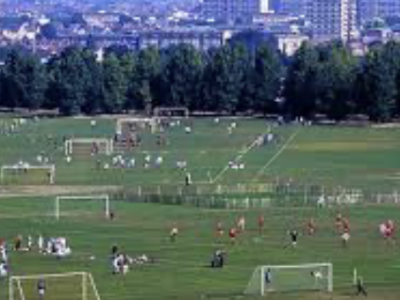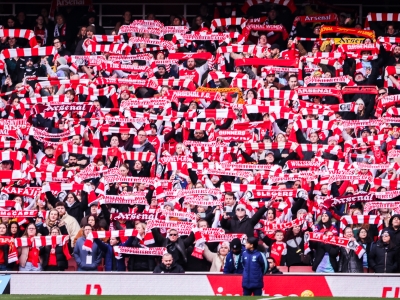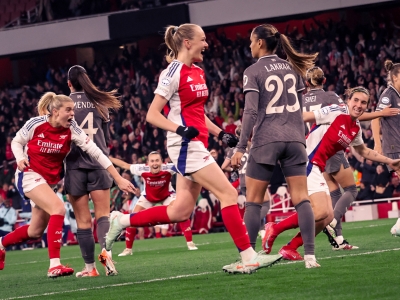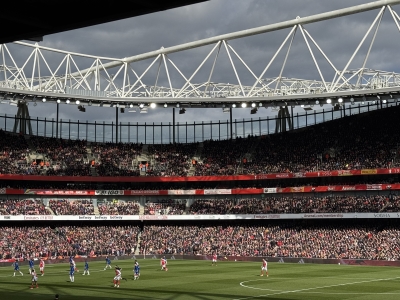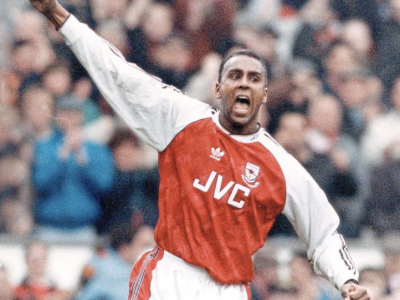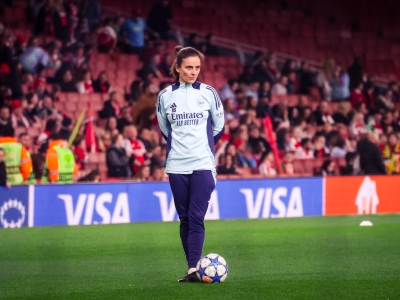"I did not see the tackle coming," Eduardo recalled of the challenge that would forever alter his career.
"It didn’t feel too bad, it just felt as if I had twisted my ankle. But I went down and all of a sudden there was a big fuss around me. Lots of people were talking and I heard someone say I could lose my foot."
It was meant to be very different for the Brazilian-born striker that day, as he looked to continue his rich vein of form and keep Arsenal's title dreams alive.
Having joined from Dinamo Zagreb in the summer of 2007, Eduardo had found his groove in the cup competitions with 8 goals in 16 games, but that was in contrast to his struggles in the league as he failed to find the net until late December.
He finally sparked into life on a night at Goodison Park, netting a brilliant brace in a 4-1 Gunners win. A productive six-game spell followed with fine strikes against West Ham and Manchester City, as well as three assists.
It looked as if he would play a key role in Arsenal's title charge, but that all came crashing down on a chilly February afternoon in the Midlands.
Gripped by fear
Arsene Wenger's side went into the game against Birmingham sitting five points clear at the summit with 12 games to play, and although they had Manchester United and Chelsea breathing down their necks, confidence was high after just one defeat all season.
But, the course of their season and Eduardo's career was to change with just three minutes on the clock at St Andrew's.
Dropping deep to receive a pass from Gael Clichy, the striker turned sharply and charged towards the penalty area. Martin Taylor came to meet him, diving into the challenge and crashing high into the left leg of the Arsenal man.
Eduardo's fibula and tibia fractured instantly, with the force of the challenge dislocating his ankle while shattered bones ripped into the tissue.
The injury was so graphic Sky Sports refused to show any replays, while players from both sides were visibly shocked. Alexander Hleb stood head in hands, while Bacary Sagna would later recall that Cesc Fabregas turned white at the sight of his stricken team-mate. It was all too much for them to take in.
"I’m told the injury is so disturbing we cannot show pictures of it," said BBC commentator Jonathan Pearce. "Rarely have I seen such collective anguish amongst football players."
Eduardo would later recall those moments he lay helpless on the St Andrew's turf.
"I laid there, I didn’t even try to wriggle my toes, I forgot about the pain, I forgot about everything," he said.
"At that moment, I was so uncertain of the future. I was gripped by fear. I was unsure of what would happen.
"Medics gave me pain relief, so much pain relief — morphine — that my head went a bit dizzy and I can remember holding on to the arm of our physio very tightly."
He laid there for over seven minutes before being stretchered off and taken to Selly Oak Hospital where he was successfully operated on, but it was only the beginning of an arduous journey for the Croat.
The saviour
Arsenal physio Gary Lewin was one of the first on the scene, rushing to Eduardo's aid from the Arsenal bench.
As the striker was stretchered off the pitch, Lewin was seen staring blankly at the turf, clearly shaken by what he had seen. But the injury would have been a lot worse had it not been for his quick thinking.
"The first thing to think about is if it’s either a life-threatening or limb-threatening injury. With Eduardo it was obvious it was a limb-threatening injury," he remembered in an interview with Goal.
"Then you go through the process of stabilising and immobilising the injury, working out how you are going to get them off the pitch in the best way and controlling the pain."
The injury will forever stick with Lewin, who added: "I couldn’t tell you the dates of any cup finals, but I can tell you the date of Eduardo’s injury."
Eduardo later expressed his gratitude to Arsenal's physio, saying: "The injury was so grave I could have lost my foot, so I will always be grateful to Gary for what he did in lowering the risk to my leg. That was decisive."
Disgust
Taylor claimed that his horrific challenge was not malicious, but not everyone agreed.
Wenger - who had earlier comforted his shaken players on the pitch - was left enraged by Taylor's challenge.
"I think this guy should never play football again,” he said after the game. "What is Taylor doing on the football pitch?"
He also called for the defender to receive a lifetime ban from football, and although he would later retract that comment, it was the words of a man left shocked and angered not just by what he had seen, but the impact it had on his team.
Meltdown
As Eduardo was whisked to hospital, things unravelled for Arsenal.
The game would finish 2-2 after Birmingham equalised with a late penalty, and then William Gallas infamously lost his head.
The Gunners captained kicked an advertising hoarding, berated the St Andrew's crowd and then sat in the centre circle while his team-mates filed down the tunnel in an embarrassingly public breakdown.
When he did finally return to the dressing room, he and Gilberto Silva nearly came to blows when the Frenchman accused the midfielder of attention-seeking. In fact, the Brazilian had played a key role in Eduardo's treatment, acting as a translator with him being the only player who spoke Portuguese and English.
Arsenal's season would then crumble around them. The Gunners won just one of their next eight games, losing to title-rivals Chelsea and Manchester United as Sir Alex Ferguson's side stormed to the top of the table.
Despite winning all of their four remaining games, Wenger's side had blown it. They slipped to third and the Red Devils were crowned champions on the final day of the season.
In an interview with Goal, Wenger would reveal his belief that Eduardo's injury and that afternoon in the Midlands led to Arsenal's collapse.
“That day at Birmingham was bad. It put insecurity into the team and we were not able to come back," he said.
Sagna would echo that belief, saying: "For sure it was a turning point in our season.
"We’re all different, we all express our feelings in a different way. Some will take it, some will keep going and some will struggle to do it. We are only humans.
"I think everyone got hurt in a way and some more than others. Unfortunately, it’s part of football and we know that we can get injured quite badly. It was a bad day.
"When you lose someone, back in the day we were young and maybe we didn’t know how to deal with these kinds of injuries.
"For most of us, it was the first time of seeing it live. We had to be able to separate feelings and work, but as I said before we’re only humans. It was just a bad day, a bad memory."
Strife
As for Eduardo, the hard work was beginning.
Following his surgery, he relocated to Rio de Janeiro to be near family and friends. He spent four months in Brazilian undertaking a gruelling rehabilitation consisting of six and seven-hour sessions every single day.
As the striker grew stronger, he eyed a return to action, with the hope being he would be back before the turn of the year.
Wenger had his concerns though. The operation to help fix his shattered bones saw plenty of metalwork implanted in his leg, and the Arsenal boss worried that this would limit his pace and mobility - aspects of his game that made him so dangerous.
Eduardo endeavored to prove his manager wrong.
It was meant to be
Although the Croat returned to action in a reserve game against Portsmouth in December, injury setbacks would force him to wait until February 16, 2009, for his first-team return.
Cardiff City were the opponents in an FA Cup fourth-round tie at the Emirates, with Eduardo named in the starting XI.
With the frustration of almost a year on the sidelines burning inside him, and even the doubts of Wenger strong in his mind, he set about doing what he'd done so well before his injury.
It only took him 21 minutes.
Having picked up the ball on the edge of the box, Eduardo rolled a pass to his left and into the path of the overlapping Carlos Vela before setting off into the area.
Vela's cross was a striker's dream, clipped at the perfect weight and height for the returning Croatian to meet. Drifting between two Cardiff defenders, Eduardo met the delivery with his head to guide the ball into the corner.
The Emirates erupted in pure joy at the sight of player who had been through so much, coming back after so long, and doing what he did best. It truly was a feel-good football moment.
"Some things are just meant to be,” it would lead commentator Clive Tyldesley to say.
Eduardo wasn't done there though as he earned and scored a second-half penalty to cap off an emotional night.
"It was the best day of my life because it proved I can play again," he said after the game.
"It was a special moment to score and very emotional. I had tears in my eyes."
Wenger would add: "Everyone is happy for him.
"It was a good team performance – dynamic, convincing, the kind of game we like to play, with added drive going forward and Eduardo played a big part in that.
"He has done extremely well in training and about two weeks ago made a big step forward.
"Eduardo is a small guy but has the mental strength of a mountain."
Never quite the same
Eduardo showed another glimpse of his quality in the next round when Burnley visited the Emirates.
When Alex Song clipped a pass over the Clarets defence just after the break, Eduardo found himself in space behind the backline. His instinctive brilliance kicked in as he volleyed the ball first time with the outside of his left foot, flashing an unstoppable shot past Brian Jensen into the top corner.
It was a goal equally sublime as it was audacious, leading commentator Peter Drury to exclaimed: "How dare you be that good?"
But, for all these fleeting flashes there was the inescapable reality that Eduardo just wasn't the same player he was before his injury.
His influence on the Gunners wained as he became a squad player, rolled out for cup games against lower league opposition and meaningless Champions League encounters. It was a sad end for a player who could have done so much more.
The last hurrah
When Shakhtar Donestk offered £6m for Eduardo's services in the summer of 2010, it was too good of a deal for Wenger to turn down, and the Croatian bid an emotional farewell to north London.
But, he would get his chance to say a proper goodbye just three months after moving to the Ukraine as his new side were drawn against his old one in the Champions League group stage.
On October 19, Shakhtar visited the Emirates and had a torrid time. The Gunners led 3-0 with just over an hour gone, and then Eduardo arrived, turning the routine evening into an emotionally-charged, feel-good occasion - much like that February night against Cardiff more than a year earlier.
Upon his introduction as a 63rd-minute substitute, the Emirates rose to its feet to welcome its former hero with a standing ovation. A louder cheer came with just eight minutes to play when the ex-Gunner smashed home a volley to make it 5-1. It was the last hurrah Eduardo deserved.
“I felt like I should have never left Arsenal and I felt very emotional in that game,” he said.
“I was nearly crying when I came back, so I had to try to fight with my emotions inside because it was a very nice reception from the fans. That day was unbelievable."
Eduardo retired in 2018 after spells in his native Brazil, a second stint at Shakhtar, and in Poland with Legia Warsaw.
He was never quite the same player he promised to be before his horrific injury, but in the fleeting moments and joyous returns, he truly was a joy to behold.

.jpg)
